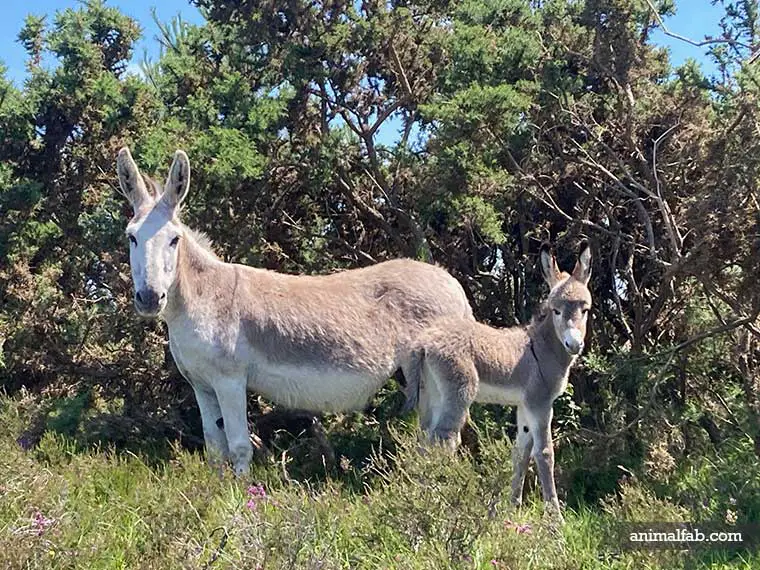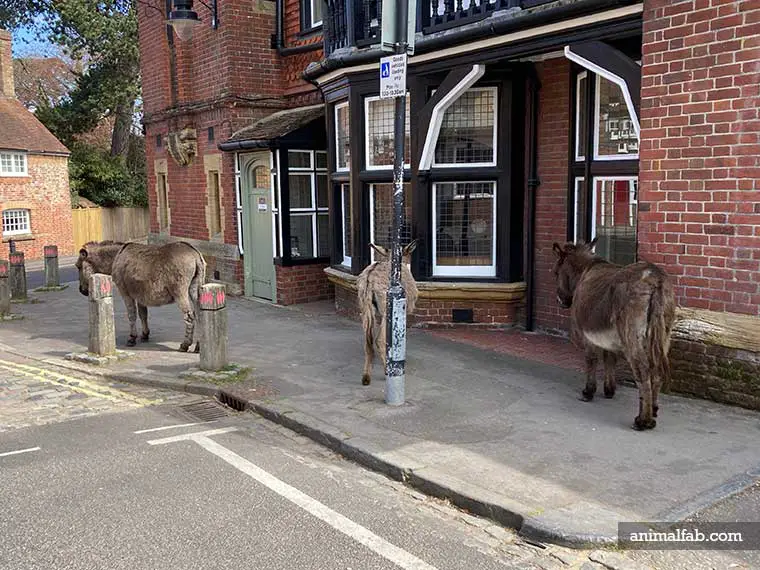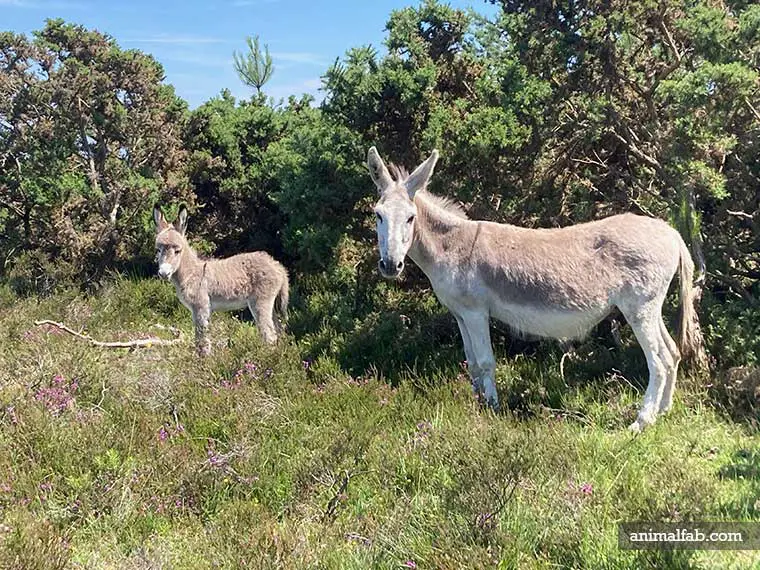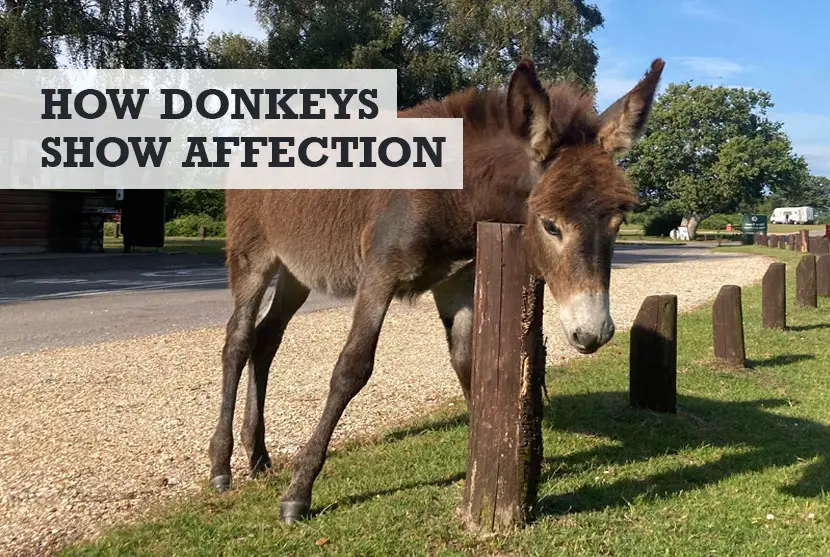On a recent walk through the New Forest in England, we were lucky enough to encounter donkeys roaming on the heathland. Some were very friendly and appeared to like us, others were more guarded and didn’t seem to trust us. There’s good reasons too, which I will explain below about how donkeys show affection to humans and other donkeys.
How do donkeys show affection? Donkeys show affection and that they like you by approaching you to be petted, following you, nuzzling at you, wrapping their body around you, and possibly blowing air gently through their nose on you.
But a word of warning. I do not recommend approaching donkeys if you are not familiar with them and don’t have a bond with them. Let donkeys approach you, and never, ever walk up behind one as their kicks are extremely powerful.
With that warning out of the way, let’s take a closer look at how you can get a donkey to trust you, and at its most simplistic, how to know if a donkey even likes you.

How to make friends with a donkey
If you want to bond with a donkey so that they start to trust you then you can start to practice the following habits.
- Establish a routine: If your donkey knows that seeing you at 8am in the morning means feeding time, you will be become his friend and he will always be excited to see you. Stick to regular feeding times, and a friendship will quickly build.
- Always act calm: If you approach a donkey quickly or erratically they will frighten easily and will not trust you. Always move slowly and careful, and talk in a calm and measured voice.
- Encourage play: donkeys enjoy playing with toys, and happy donkey will be one that will become your friend quicker. Some people who keep them use hula hoops, beach balls, and even piles of dirt for them to roll and play in.
- Reward with praise: If your donkey behaves well, lavish him with vocal praise, attention, and petting to build up trust and friendship bond.
- Scratch and pet in the right places: Donkeys will be your best friend if you pet them in the right place. They love being scratched at the base of their tail (be careful where you stand), and love their ears being rubbed.
Donkeys won’t become a trusted friend overnight. It will take time to build the bond of friendship, but once you do, you might have a friend for life. Donkeys get very attached to their human owners if treated well.
How do donkey show fear
You should treat donkeys with the utmost respect and understand the warning signs they show when unhappy. Whilst you might want to make friends with a donkey, they might not want to make that bond with you.

According to The Open Sanctuary Project, signs that a donkey is unhappy and fearful include:
- Walking away from you.
- Distressed braying, even a night.
- Pinning their ears back close to their neck.
- Holding their head high (could indicate that they might be spooked or ready to bolt).
- Lightly to moderately pawing at the ground or stomping (can indicate anxiety or irritation).
- Raising one of their legs.
- Flaring their nostrils or snorts a lot.
- Tightening their mouth and muzzle muscles.
- Squinting or darting their eyes.
- Rapidly swishing their tail.
- Full body trembling or shaking.
This fearful behavior can then escalate further to include the following signs that they might attack or bite you shortly.
- Rapidly swivelling their ears back and forth (a sign of high anxiety or alertness).
- Pawing angrily at the ground (can indicate they are ready to charge).
- Cocking their hind hoof with ears pinned back (avoid their hind area in cases like these).
- Openly baring their teeth at you or biting you.
- Having widely open eyes to the extent that you see the whites of their eyes.
Handy Hint: How fast a donkey can run might actually surprise you. It won’t be as slow as you actually think!
More about donkeys
Donkeys have been around for thousands of years. They are gregarious and affectionate herd animals but have seldom been afforded the opportunity to live as such.
They are often seen alone, stoically carrying heavy burdens.
With the arrival of the locomotive, the role of the donkey as a pack animal has declined dramatically, along with its numbers. They are increasingly being found in shelters and other rescue situations, where their true personalities have been uncovered.
Until you can get a donkey to trust you (limited petting is advised), you can stroke them around the neck, ears, shoulder areas at first. Avoid the nether regions as donkeys have the ability to land an accurate and viscious kick somewhere on your person.
If they have grown up knowing and trusting humans, they will be forthright in giving and demanding affection. They will follow you around like a puppy and want nothing more than to be with you – they have also been known to do this with other animals such as horses (here’s how to introduce them).
As I’ve explained above, once you make friends with a donkey, it’s quite a hard bond to break. When donkeys like you, they will show huge amounts of affection and even display guarding instincts – this can include attempting to wrap themselves around you, which can be disconcerting as they are tall and sturdy.
A short history of donkeys
Donkeys originate from the desert regions of northern Africa. There are records of donkeys as far back as Biblical times.
In the wild, they were efficient in drawing nutrition out of the most marginal land. They were strong animals, able to carry a quarter of their bodyweight.

They were relatively easy to catch and domesticate, and did not require much in terms of upkeep. They would eat straw that horses were too fussy to eat. Consequently, they became popular as beasts of burden in the region.
It was also found that they were loyal and courageous guards of vulnerable livestock. They were employed to protect animals in remote areas, warding off predators and raising the alarm with their impressive vocal capabilities.
Donkeys, of various breeds, soon spread to the scrublands of the Mediterranean region. From there, these useful animals spread to the rest of the world, to work.
Over the last hundred years, however, their numbers have dwindled to less than 10% of the estimated population of the early twentieth century.
Tourist publications in Europe still depict them as solitary, loyal companions of peasant farmers, trudging along country roads, carrying large bundles of hay.
In reality, peasant farmers cannot afford to pay the upkeep of an animal that does not pull its weight. Donkeys are often lonely and forced to work hard to earn their keep.
On retirement, in days of yore, donkeys that were no longer fit for service, would not have been put out to pasture, but sold to the glue factory!
Thankfully, there are alternative solutions today, in the form of donkey sanctuaries around the world. Animals who have worked all their lives are now earning their keep cohabiting with other retired donkeys, and attracting financial support from tourists and animal lovers.
There is also a small but lucrative market for donkey milk which is produced organically. It is leaner than cow’s milk, and is used among other things, to make sausages and skin care products.
The affectionate nature of donkeys
The image of the donkey is one of slightly downcast stoicism, a loyal workhorse carrying out its duties without complaint. Donkeys do have a long-suffering, even temperament.
They do not readily display signs of anxiety or distress, and it is difficult to tell if a donkey is ill. They seem to silently accept their lot.
They were never meant to be loners, too tired to sleep at the end of each day.
In their natural environment, donkeys would run with a herd. They draw emotional support from one another, and feel safe and secure in numbers. Surrounded by their herd, they are able to browse happily and sleep well.
Like the young of most species, foals are curious and energetic. Adults are naturally vocal with a range of calls, depending on their mood and prevailing needs. They also communicate with their ears, and of course, most effectively with their feet.
They live for 40-50 years and form strong pair attachments during their lifetimes. The ‘burro bond’ can be very powerful, resulting in deep mourning if a companion dies.
In the absence of a donkey family or mate, these animals will transfer their affections to humans, other livestock or pets.
Keeping donkeys as pets
It takes enormous commitment to keep a donkey. Relative to the number of donkeys that work for a living, there are very few kept as pets.
A standard donkey would stand at around 56 inches at the shoulder, just short of six feet. Larger breeds may be a foot taller. A viable alternative, as a pet for a child, would be a miniature breed, that grows to about three feet at shoulder height.
Given their sociable nature, you would not want to keep one without a companion, so it would be preferable to acquire at least one other donkey.
They are large animals and require approximately an acre each in which to graze. They do not fare well on ‘rich food’ and need supervision to ensure that they do not overeat. If they do not burn off the calories consumed, they are prone to becoming overweight, and ill.
Donkeys need to be sheltered when it rains as they can catch a chill if their fur remains damp for any length of time.
They live for almost half a century, so that even a middle-aged donkey will require decades of care. You need to be relatively fit in order to lug huge bales of hay to their stables for years to come.
Their hooves need regular, bimonthly care and they need dental checkups every second year.
They vocalise their feelings as the mood takes them, which could be a three in the morning. Their voices carry and may annoy neighbours who live close by.
Donkeys have individual personalities but as a species are intelligent and curious. They will imitate human behaviour to achieve their goals. For example, they will watch how you open doors, gates and locks, and will make their escape when you least expect it.
If left alone for any length of time, they may become bored or lonely, and cause destruction of property by chewing or kicking.
Handy Hint: Here’s a list of foods that you should never feed to a donkey.
Donkeys as charmers
If they form close ties with humans they will nuzzle, looking for affection. Mothers tend to rest their heads on their foals’ necks to comfort them. These may well look for similar comfort under your neck or between your legs so best not to wear a skirt around them.
They will follow ‘their’ humans around constantly if allowed, and this is where their ability to open doors comes in handy. They will even follow you indoors, if they get a chance.
A bonded donkey will want to be physically close to you and will not understand the notion of personal space. It will nudge and butt up against you. People with two pet donkeys have been known to be squeezed, gently, between the pair.
If donkeys are housed in an establishment with paying guests, they will call the guests and soon have them trained to bring treats. Guests need to be made aware that donkeys are prone to insulin resistance and diabetes from consuming sweet treats. Even healthy treats such as apples and carrots need to be monitored to prevent obesity.
In return they will allow the guests to stroke and scratch their chest, neck and backs. It is not desirable to touch their nose and mouth areas as these are more sensitive.
More mischievous donkeys may be inclined to nibble strangers to encourage the production of more treats. This behaviour should not cause alarm but should certainly not be rewarded.
Conclusion
Donkeys can get very attached to their human owners, and having one (or better still, a pair) can be extremely rewarding. If you treat them well, donkeys will show affection to you daily and treat you like a trusted friend.
You might also like…
- When you will know your donkey is ready to give birth
- Can donkeys mate successfully with horses?
- The surprising anatomy of a goat’s stomach

